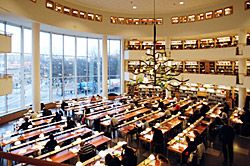Activities
During its first 40 years, the foundation has awarded grants for a total of SEK 425 million. Grants have been focused on three main areas, all mainly related to the School of Business, Economics and Law at the University of Gothenburg.
The first area was the construction of new premises for the school. The Foundation contributed to the building of the new complex, which opened in 1995. The buildings were designed by the firm of architects Erséus, Frenning och Sjögren Arkitekter AB.
A great deal of thought went into the artistic decoration of the buildings, which was acknowledged when the architects received Sweden’s largest architecture prize, the Kaspar Salin Award, in 1995, for the facilities. Professor Kurt Grönfors, first chairman of the Malmsten Foundation, was among those who spearheaded the efforts that resulted in the new complex.
The second area of activity was related to filling the School of Business, Economics and Law with exciting new activities. For instance, a chair was established for a visiting professor, chairs for co-opted professors were funded, and other measures taken to raise the level of expertise in various subject areas and educational programmes. Substantial grants were also made to the Economics Library and to the Gothenburg Research Institute (GRI). A great deal of funding has also been put into internationalization, not least with the implementation of the international Master’s programme at the Graduate School (GS).
In 2022, the School of Business, Economics and Law established an international visiting researcher program for postdoctoral students, the Richard C Malmsten Young International Scholar Program, which is made possible through annual grants from the foundation.
The third main area in which the Foundation has been active is in funding individual research projects. However, in recent years this funding has been cut back in favour of a greater focus on developing the School of Business, Economics and Law as a whole. Funds have also been granted to activities for an improvement to the study environment, and student organisations.
